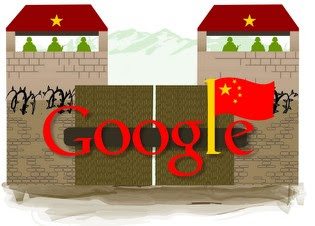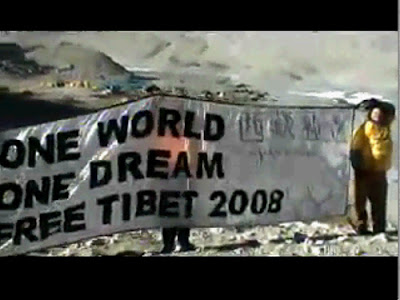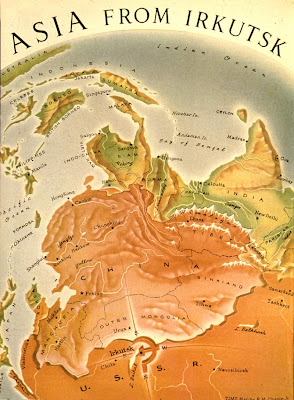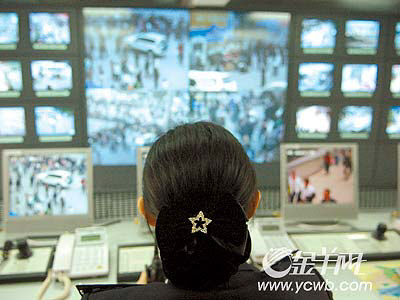
Xeni Jardin at BoingBoing recently linked to an opinion piece by one Oxblood Ruffin, a Canadian hacktivist and member of the Cult of the Dead Cow hacker collective. The piece is entitled “Google, China and Genocide”. I thoroughly enjoy BoingBoing, not only for “adorable cyclops kittens” but also for Cory Doctorow’s copyfight links and Xeni’s trips to places like Guatemala. But material in China at BoingBoing always drives me nuts, since there’s an almost exclusive focus on two issues: censorship and Tibet. The BoingBoing view of China is summed up pretty well by the image above, made by Students for a Free Tibet, that they’ve embraced; they’re welcome to it, but I find it far too oversimplistic and counterproductive, as I do Oxblood Ruffin’s position in his article. This week Ruffin will speak on a panel sponsored in part by Harvard Law School about campaigning for human rights at the Beijing Olympics, as part of their Human Rights and Media project. I wish I could attend, but here are my thoughts on his piece. I’m reprinting it with my comments since CDC is blocked here in China.
When content filtering targets a race of people for purely political reasons, and an American company provides the technology to enable that filtering, then it’s time to shame the enablers. To date, Google has been criticized solely for providing China with the means to censor the Internet.But a tragic consequence of Google’s collaboration — and one that has been entirely overlooked — is its contribution to the cultural genocide of the Tibetan people.
For starters, let me just say that I think Google has generally mucked everything up in its China approach. From the establishment of Google.cn servers on the Mainland, to its “New Coke” renaming gaff as Guge, its pinyin IP scandal, Google seems pretty lost in China. But to claim Google has been “providing China with the means to censor the Internet” is just wrong. One can point fingers at Cisco for the training and expertise it provides to the People’s Security Bureau, but China already has the means for censorship. It has for a while.
Cultural genocide is a scandalous charge. But what exactly does it mean? Raphael Lemkin, a legal scholar, was the first to use this term in 1933. Mr. Lemkin had some expertise on the topic both as an intellectual and as a Holocaust witness. According to Lemkin, the term means the”deliberate destruction of the cultural heritage of a people or nation for political or military reasons.” Since no recognized academics dispute that”historic Tibet” has been subject to government-sponsored population relocation programs, creative map-drawing, and wholesale destruction of its cultural institutions, then by definition cultural genocide has taken place.
Yup, that’s a scandalous charge alright. I won’t argue that Tibet has been subject to relocation programs and the like, but reiterate what I said in the previous post, people of all ethnic persuasions across China have suffered these crimes. Han Chinese traditions and customs have also suffered tremendously in the past fifty years, but the Free Tibet community seems to precious little time to consider that this is not limited to only one ethnic group. Uyghurs, Mongols and other minorities have faced the same degradation as well, but somehow they never are worth mentioning in the Tibetan activist community, except briefly in passing. The goals of activists such as yourself rarely if ever address the rights of these other peoples. Every single crime listed in the UN Draft Declaration on the Rights of Indigeneous Peoples could conceivably applied to Chinese citizens of every ethnic group.
No Tibetans were consulted when the United Kingdom and China signed a series of imperial documents agreeing to divvy up Tibet according to their own interests. According to the People’s Republic of China, suzerainty trumped sovereignty, especially when the occupied territory [Tibet] was weaker and its location was strategic in relation to one of China’s historic adversaries[India]. It was also convenient that Tibet was rich in natural resources and had enough vacant real estate to absorb millions of migrant Chinese nationals.
And so began the physical genocide. In 1950, the People’s Liberation Army “peacefully liberated” Tibet, something akin to saying that Adolf Hitler was a good friend of European Jewry. From 1950 to date, 1.2 million Tibetanshave died as a result of mass slaughter, imprisonment, or starvation;7.5 million Han Chinese have migrated into historic Tibet, now appended to Sichuan, Yunan, and Gansu provinces, and the more recently chartered province of Qinhai; over three thousand Buddhist monasteries have been razed and their cultural properties destroyed or plundered; and iconic religious leaders –the recognized figureheads of traditional Tibetan culture — have been forced into exile, imprisoned, executed, or kidnapped.
And so were thousands of monasteries, churches and mosques destroyed, as well as religious leaders, and various other peoples exiled, imprisoned, executed or kidnapped. But as John Powers has pointed out, the Tibetan activist community tries very hard to distinguish Tibet as being completely unrelated to the rest of China. The identical problems that millions of other ethnic groups, including Han, have faced apparently take a backseat to the importance of Tibetans. Have you considered how this approach might make Han Chinese people feel about your message?
Cultural genocide is subtler than physical genocide — its tools are less obvious. So now China can extend its dilution of Tibetan culture into cyberspace with expert assistance. Google has agreed to filter out every aspect of Tibetan life that the Chinese government finds offensive, leaving only propaganda, misrepresentations, and outright lies about Tibet and Tibetans. It’s amazing. The Tibetan people spent thousands of years developing their history and culture, and Google managed to make it disappear in little more than a year with only a few algorithms.
Let’s be clear – Google.cn filters out the Tibetan exile community. Google.com/intl/zh-cn does not, nor do the various other languages of Google. These are all accessible in China (at least on my connection, and the people in China that I know). Google.cn is, as a result, a fig leaf of sorts. I think it’s a pathetic kowtow to the Chinese government, but the only thing stopping someone in China from finding this material is not Google’s website – it’s the firewall, along with Google’s willingness to create a red herring bizarro website with a .cn domain. And Tibetan culture, I should hope, does not solely exist online.
Ever since Google announced that it would deploy its emasculated server farms into Mainland China, the search giant’s collaboration with Chinese censors has been widely criticized by the human rights community, free speech advocates, and the United States Congress. Although Google claims to have consulted with many nameless NGOs before deciding to export its censorship technology to China, it failed to take anyone’s advice not to proceed. Google apparently knew better than its critics. Google even took the step of hiring someone from the Council on Foreign Relations to improve its public image with respect to corporate responsibility and geo-strategy. Regardless, Google’s arguments for continuing to capitulate to Chinese demands are misplaced,self-serving, and uninformed. They are also a threat to Western security interests.
I fail to see the threat to Western security interests. Perhaps you’re alluding to the uncontrollable “nationalist impulses” you mention below?
Google repeatedly argues two points in favor of its appeasement policies. First, Google claims that it must obey Chinese law in order to do business in the country. Second, Google claims that it is better to provide expurgated search-related information to the Chinese people than none, the cultural genocide of the Tibetan people notwithstanding.
To Google’s point of complying with the law, this argument is both specious and spurious. Because something is legal in one country does not mean that it should be countenanced elsewhere. In some countries, it is legal to have sex with children. Fortunately there are domestic and international laws on the books that encourage more normative behavior. Hiding behind a”when in Rome” way of doing business is unacceptable.
I agree this is specious and spurious, but not for the reasons you state. I think its meaningless considering the existence of google.com/intl/zh-cn.
Likewise, Google’s claim that it is better to provide some information than none is illogical and dangerous. In a country that has the fastest growing Internet user-base in the world, in which bandwidth is subsidized and the government is facilitating access for all, most of the population is not even trying to avoid censorship. Given that the Chinese government uses the Internet as a propaganda tool and that nationalist impulses among Chinese citizens can’t always be controlled, a censored Internet is not only a danger to the Tibetan people but a threat to international stability as well –although Google doesn’t seem to be very concerned about this.
There is more to the Chinese internet than simply propaganda and foaming nationalists, mind you. I agree that Google’s policy of some is better than none is a poor excuse, again because of the google.com site, but also because Google is not the power in China that it is abroad. 80% of the search market is still dominated by Baidu in China. If what you say is true, should Google unilaterally withdraw from the Chinese search market, most of the country would not even notice since, as you say, they aren’t even trying to avoid censorship or learn the things that you would have them learn. Even if Google was unfettered in China, I again refer to my last post where I point out that none of the Tibetan activist websites have any material in Chinese. What, pray tell, would you have these people read? Moreover, have you ever considered that you may have to respect, no matter how distasteful you find them, Chinese nationalist feelings if you are to ever engage them in dialogue and convince them otherwise? Does not the Dalai Lama himself consider empathy and direct engagement to be the key hallmarks of cultivating genuine compassion? Where, Sir, is your attempt to understand those you would convert?
Even if the Chinese public is the unpredictable nationalist swarm you claim, one that would endanger international stability, what is to be gained by simply chastising Google into withdrawing? Do you think nationalist emotions would calm in the face of a foreign company lecturing China on its backwardness?
Google’s argument for “engagement” has been around since the days of Apartheid. During the Reagan years, corporations began banging the”constructive engagement” drum. The beat went something like this: “Sure, we don’t like what’s going on with these poor black folks, but if we set up shop here, then they’ll make money, and there will be political reform, and eventually Apartheid will crumble.” No one but predatory capitalists supported the concept of constructive engagement. Nelson Mandela certainly didn’t support it, nor did other mainstream South African leaders. It did,however, dawn on one American business leader that Western companies could make a difference in South Africa along other lines. Rev. Leon Sullivan, aboard member with General Motors, drafted the “Sullivan Principles,” a code of conduct for human rights and equal opportunity for companies operating in South Africa.
For one thing, Google, along with Microsoft, Yahoo! and Vodaphone, has committed to a set of principles very much like the Sullivan principles. Whether anything concrete will emerge from the process can’t be said yet, but it involves a whole host of NGOs as part of the process (including Human Rights in China – you could ask your fellow panelist Sharon Kang Hom about it this Saturday). But I’m more interested in your South Africa analogy, because there are many reasons I think it’s a poor analogy.
The Sullivan Principles were adopted by hundreds of corporations doing business with South Africa. Some companies threatened to leave South Africa while others did in fact leave. These acts of corporate responsibility,bolstered by public opinion and Congressional prodding finally caused Apartheid to crumble. The specifics of South African Apartheid and censorship in China are not alike in every way, yet the fundamentals are similar. And even though Google is accused of collaborating with the Chinese government on cultural genocide, there will never be justice for Tibetans without a shared improvement in human rights for the Chinese people. Censorship harms both,although one more than the other.
The Sullivan Principles may have contributed to the end of Apartheid, but I think you overstate the case. No less a figure than FW DeKlerk, speaking from the inside of the NP government looking out, feels sanctions did not contribute that much. As he put it in an address, delivered by a proxy, at the Institut Choiseul in 2004:
I must also compliment the Institut for wishing to find out what the experience of sanctions is from the point of view of those – like the former South African government – who have been on the receiving end of international action. One can never really understand the nature of the hunt if one interviews only the hounds. The hare will be able to provide a very special and different perspective about the process – because, as the old saying goes, the hounds are running for their dinner and while the hare is running for his life!
DeKlerk outlined, sanctions had “ironic and unintended consequences”. I think the first is quite applicable to China’s reaction to such sanctions, though I encourage you to read the entire article.
• The National Party used the threat of sanctions and international pressure to rally voters to it cause in election after election. Sanctions, if anything, strengthened its hold on electoral power.
You must understand that should a Western company give ethical lectures to the Chinese government, especially while no one is attempting to find common dialogue with the Chinese public on the issue, will simply give the government one more nationalist card to play to the Chinese government. These principles could easily increase, not diminish, the strength of and support for the Communist Party which directly administers Tibet.
There are other differences that I think are even more important. South Africa had a 78% black majority – Tibetans, on the other hand, constitute a tiny fraction of the population of China. While your average white South African would have regular contact with blacks and ample opportunities to see the injustices of apartheid (and there were a substantial number of whites who opposed it), your average Chinese person has never seen a Tibetan in their life. You may as well be talking to them about Ghanaians. Also, the ANC, the Black Consciousness Movement and others maintained constant pressure, violently and non-violently, on the government. The effective political opposition that lasted within the country was of critical importance – ultimately South Africans saved themselves, they were not saved by American do-gooders. If you wish to follow a South African model, you must gain the sympathy and outrage of Han Chinese people, since Tibetans will never enjoy the outright majority that black South Africans did. Another critical difference is that apartheid had tremendous economic costs due to the very nature of the system, not outward pressure. In contrast, the Tibetan economy, such as it is, does not constitute a significant drag on the Chinese economy, nor does is discrimination institutionalized in the same way as it was in South Africa. Yes, there are education laws that hinder Tibetan language and culture, yes there are discriminatory hiring practices – but this has no comparison to apartheid. Finally, there is the grim fact that the final killing blow to apartheid was not the Sullivan principles, but the fall of the Soviet Union. South Africa was no longer an important satellite in the US battle against the Soviets, and they outlived their usefulness. China’s survival is, conversely, quite critical to US interests today, sad as that may be to hear.
Google has made a horrible mistake in judgment. It has sold out the Tibetan people, censored the Internet, made a mockery of free speech, and placed Western security interests at risk. Google can continue its maudlin tap dance of regret, or it can stand up and do the right thing. The right thing would be for Google.cn to suspend operations. Google doesn’t need anymore meetings with human rights groups and ethical investors, and it needn’t continue pretending that its neutered existence in China is making adifference to anyone other than its own shareholders. Any short-term loss to the company’s profits would be more than made up for in an internationally reinvigorated Google brand. And it could always re-enter the Chinese market if the government agreed to meet Google at least half way.
Google has certainly made some bad judgments, and I have no problem with calling for Google.cn to shutdown. I’m not entirely convinced, however, that Google would lose profits simply because I’m not sure Google.cn is making any. But I don’t believe that it would have the impact you claim.
It would only take one prestigious IT company to put the government of China on notice and create a chain reaction that could, in time, benefit Tibetans and Chinese alike. Google has a unique opportunity to match its technical innovations with ethical leadership. It can respectfully assert its values to the government of China and curtail some of its operations. In the long term everyone will be better off, especially China. One would like to believe that Leon Sullivan would have supported this approach. He knew the difference between good and evil, and he knew what to do about it.
I simply disagree. One presitigious IT company would not cause such a chain reaction. China has its own IT companies, and I seriously doubt that the Chinese government, whose entire existence rests on ideology, would risk its own suicide over a search engine that Chinese people don’t even use. Google could certainly cut its losses, both financially and ethically, by suspending Google.cn. But it won’t spark a revolution, and I highly doubt it will make any impact on the people of Tibet.










